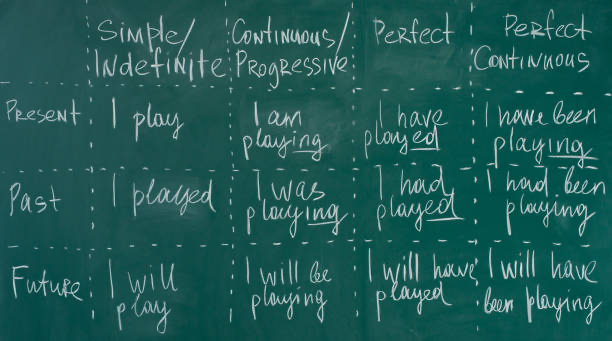Unlocking the Secrets of English Grammar: A Practical Guide
Contents
- The Importance of Learning English Grammar
- Building a Strong Foundation in Basic Grammar
- 1. Parts of Speech and Their Functions:
- 2. Sentence Structure:
- 3. Articles and Determiners:
- 4. Proper Usage of Pronouns:
- Mastering Verb Tenses for Clear Communication
- 1. Present Tense:
- 2. Past Tense:
- 3. Future Tense:
- Irregular verbs and common mistakes made with tense usage:
- Developing Sentence Structure Skills for Clarity
- Enhancing Vocabulary through Contextual Learning Techniques
- Practical Tips to Overcome Common Grammar Mistakes
- Resources and Tools for Self-Study
- Clapingo: Your Trusted Companion in English Language Learning
- Mastering English Grammar
- FAQs

The Importance of Learning English Grammar
Grammar is the backbone of any language, and learning English grammar step by step is essential for mastering the language. Whether you are interested in improving your spoken English or enhancing your writing skills, understanding grammar forms the foundation for effective communication. Let's first explore how important it is to learn English grammar:
1. Grammar as the Key to Effective Communication:
Proper knowledge of grammar enables you to express yourself clearly and accurately.
It helps you construct meaningful sentences that convey your thoughts precisely.
Research shows that grammar is an indispensable part of English Language Teaching as well.
2. Impact on Spoken and Written English:
Learning grammar enhances both spoken and written English.
In spoken English, grammar ensures clarity in speech and minimizes misunderstandings.
In written English, correct grammar makes your writing coherent and professional.
3. Benefits of Learning English Grammar:
Improved Fluency: By understanding grammar rules, you can speak fluently without hesitation.
Enhanced Accuracy: Correct usage of grammar ensures accuracy in both speaking and writing.
Better Comprehension: Studying grammar enables you to understand others' communication more effectively.
4. Confidence Boost:
When you have a firm grasp of English grammar, it boosts your confidence in using the language.
You'll feel comfortable expressing yourself without worrying about making mistakes.
Remember, learning how to learn English grammar step by step is crucial for achieving proficiency in the language. It opens up doors to effective communication and personal growth.
Now that we know the significance of building a strong foundation in basic grammar, let's look at the step-by-step guide to mastering the fundamental elements of sentence structure, parts of speech, and proper usage of articles, determiners, and pronouns.
Building a Strong Foundation in Basic Grammar

To build a solid foundation in basic grammar, it's essential to understand key components of English grammar such as parts of speech, sentence structure, articles/determiners, and pronouns.
1. Parts of Speech and Their Functions:
Learning parts of speech and their function in an English sentence can be an excellent step to begin your grammar learning journey. Here is a table that provides some basic information about these:
Noun | Nouns represent people, places, things, or ideas. |
Verb | Verbs express actions, states of being, or occurrences. |
Adjective | Adjectives describe or modify nouns and pronouns |
Adverb | Adverbs modify verbs, adjectives, or other adverbs to provide additional information |
2. Sentence Structure:
The next step is understanding the sentence structure. Most sentences are made of sentences and predicates.
Subject | Who or what the sentence is about |
Predicate | What the subject is doing or being |
3. Articles and Determiners:
Using Articles Correctly: Learn when to use "a," "an," and "the" before nouns to provide appropriate context.
Understanding Determiners: Become familiar with determiners like "this," "that," "these," and "those" to indicate specificity or quantity.
4. Proper Usage of Pronouns:
Learn how pronouns replace nouns to avoid repetition in sentences.
Master using pronouns such as "he," "she," "it," "they," etc., accurately based on gender, number, and case.
By acquiring a firm grasp of these foundational elements of grammar, you'll become more proficient in constructing sentences correctly. This knowledge will serve as a solid base for further exploration into verb tenses, advanced sentence structures, vocabulary expansion techniques, and avoiding common grammar mistakes.
Mastering Verb Tenses for Clear Communication

Verb tenses play a crucial role in accurately conveying time-related information in English. Whether you are speaking or writing, using the correct verb tense is essential for clear communication. Understanding verb tenses is like having a time machine that allows you to express actions and events in relation to the present, past, and future. By mastering verb tenses, you can effectively communicate when something happened or will happen.
In this section, we will explore the different verb tenses, provide explanations with examples, highlight common mistakes, and suggest online resources for further practice. Here is a detailed explanation of present, past, and future tenses with examples:
1. Present Tense:
The present tense describes actions happening now or regularly. For example:
I walk to school every day.
She teaches English at a language institute.
They eat dinner together every evening.
2. Past Tense:
The past tense refers to actions that have already happened. For example:
I walked to school yesterday.
She taught English last year.
They ate dinner together last night.
3. Future Tense:
The future tense indicates actions that will occur later. For example:
I will walk to school tomorrow.
She will teach English next semester.
They will eat dinner together tonight.
Irregular verbs and common mistakes made with tense usage:
Irregular verbs can be tricky as they don't follow the typical patterns of conjugation. Examples include "go/went/gone" or "be/was/were/been." It's important to memorize these irregular forms to use them correctly in sentences.
Common mistakes with tense usage often involve using the wrong form of the verb or switching between tenses inappropriately. For example, saying "I go to the movies yesterday" instead of "I went to the movies yesterday." These mistakes can affect the clarity and accuracy of your communication.
Developing Sentence Structure Skills for Clarity
Effective sentence structure is essential for clear communication in English. In this section, we will delve into subject-verb agreement, sentence formation rules, and common sentence structure errors, and suggest exercises or interactive platforms for practice.
Subject-verb agreement
Subject-verb agreement ensures that the subject and verb in a sentence match in terms of number (singular/plural). For example:
The dog barks. (singular subject)
The dogs bark. (plural subject)
Inconsistencies occur when there is a mismatch between the subject and verb. For instance:
The dog barks at cats. (correct)
The dog bark at cats. (incorrect)
Sentence formation rules
Before looking at the sentence structure rules, you should be aware of independent and dependent clauses. Independent clauses have a subject and a verb and can exist as a complete sentence on their own. Though dependent clauses also have a subject and a verb, they cannot make complete sense on their own. So they usually occur with independent clauses.
1. Simple Sentences: These consist of one independent clause conveying a complete thought.
Example: I love reading books.
2. Compound Sentences: These combine two independent clauses using coordinating conjunctions.
Example: I love reading books, and I enjoy writing stories.
3. Complex Sentences: These contain one independent clause and one or more dependent clauses.
Example: Although I love reading books, I don't always have enough time.
Common sentence structure errors
Run-on sentences occur when two or more independent clauses are joined without proper punctuation or conjunctions. It's important to separate them into distinct sentences or use appropriate punctuation.
Fragments are incomplete sentences lacking a subject, verb, or both. They need to be revised to form complete thoughts.
Remember, mastering verb tenses and sentence structure skills will significantly enhance your English communication abilities. So keep practicing!
You can check out this Clapingo article that talks about the nuances of sentence formation for a more detailed explanation: Master English Sentence Formation: Beyond Grammar Basics(clapingo.com)
Enhancing Vocabulary through Contextual Learning Techniques
Vocabulary plays a crucial role in effective communication. It allows us to express ourselves clearly and articulate our thoughts with precision. To boost your vocabulary beyond grammar, you need to explore various techniques that engage you with the language in real-life contexts.
Here are some effective strategies to enhance your vocabulary:
1. Explore extensive reading: Reading extensively exposes you to a wide range of words and phrases used in different contexts. Choose books, articles, or blogs that align with your interests and read them regularly. This will not only expose you to new vocabulary but also enhance your understanding of how words are used in different sentences.
2. Watch movies/TV shows: Watching movies or TV shows in English offers an engaging way to learn new words and phrases. Pay attention to the dialogues, expressions, and slang used by native speakers. Subtitles can be helpful for better comprehension.
3. Engage with authentic materials: Authentic materials such as newspapers, magazines, podcasts, and TED talks provide valuable exposure to real-life language usage. These resources often feature up-to-date vocabulary related to current events, technology, business, and more.
4. Learn word families and collocations: Word families are groups of words derived from the same root word (e.g., educate, education). Learning these word families helps expand your vocabulary systematically. Collocations are words that naturally go together (e.g., fast food). Familiarizing yourself with common collocations improves fluency and accuracy in expressing ideas.
5. Utilize online tools and resources: Online platforms offer a multitude of tools specifically designed for vocabulary building. For instance, this Clapingo article will give you a list of everyday words to learn easily: Spoken English Words List To Learn English Under 15 Days! | Clapingo
6. Importance of context: Understanding the context in which a word is used is essential for accurate comprehension. A word may have multiple meanings depending on the context. Pay attention to the surrounding words, phrases, and sentences to grasp the intended meaning.
By incorporating these strategies into your language learning routine, you can expand your vocabulary and enhance your English proficiency. You can also check out this Clapingo article for building your vocabulary: 100+ Daily Use English Words for Fluent Communication (clapingo.com)
Practical Tips to Overcome Common Grammar Mistakes
Grammar mistakes can hinder effective communication and impact your overall language proficiency. To eliminate these errors, it's important to identify common grammatical mistakes made by English learners and implement effective strategies for improvement.
Here are some practical tips for overcoming common grammar mistakes:
1. Looking out for subject-verb agreement: One of the most common errors is improper subject-verb agreement. Remember that singular subjects take singular verbs, while plural subjects take plural verbs. Practice recognizing subject-verb agreement patterns in sentences to improve your accuracy.
2. Practise verb tense consistencies: Inconsistent verb tenses can make sentences confusing or convey incorrect information. Be mindful of maintaining consistent verb tenses throughout your writing or speaking. Regular practice and self-correction techniques can help you identify and rectify tense inconsistencies.
3. Use grammar checkers: Utilize grammar checkers available online, such as, Grammarly to identify grammatical errors in your writing. These tools highlight errors and suggest corrections, enabling you to learn from your mistakes and improve over time.
4. Language exchange platforms: Engaging in language exchange programs or online platforms allows you to interact with native English speakers who can provide feedback on your grammar usage. This exposure helps in identifying areas of improvement while gaining confidence in using correct grammar structures.
5. Hiring a tutor: Consider hiring a qualified English tutor who specializes in teaching grammar rules and provides personalized guidance based on your specific needs. A tutor can offer valuable insights, correct mistakes, and provide targeted exercises for improvement. You can enroll in Clapingo's English grammar courses to find qualified tutors who give you personalized attention.
By implementing these tips into your language learning journey, you will uncover the secrets to eliminating grammar mistakes with ease and improve overall fluency in speaking and writing English.
Resources and Tools for Self-Study
Learning English grammar requires consistent effort and practice, and self-study plays a crucial role in achieving proficiency. By taking charge of your own learning, you can set your own pace, focus on areas that need improvement, and explore various resources. Here are some valuable resources and tools to enhance your grammar skills:
1. Online Platforms, Apps, and Websites:
To learn perfect sentence formation in English online, there are several platforms that offer interactive grammar exercises and quizzes. These resources allow you to practice grammar rules in a structured manner. One such platform is Duolingo, which provides a wide range of lessons, exercises, and assessments to help you strengthen your grammatical knowledge. This Clapingo article can also help you choose an online course to improve your language skills: Top 8 powerful English speaking courses in 2022 Guide - Clapingo
2. YouTube Channels Offering Grammar Lessons:
YouTube has become a treasure trove of educational content, including English grammar tutorials. Some popular channels specialize in providing comprehensive lessons on different aspects of grammar. Check out Oxford Online English for engaging videos that break down complex concepts into easily understandable explanations.
3. Joining Online Communities or Forums:
One of the most effective ways to improve your English grammar skills is by immersing yourself in a supportive community of language learners. Online forums or communities enable you to interact with fellow learners from around the world, ask questions, share experiences, and receive feedback on your writing or speaking skills. Engaging with others who are on the same language-learning journey can be highly motivating and beneficial.
Now that we have explored various self-study resources let's take a closer look at Clapingo - the online platform designed to boost your English grammar skills.
Clapingo: Your Trusted Companion in English Language Learning
Clapingo is an innovative and reliable online English learning platform that provides a comprehensive range of courses to help learners improve their grammar skills. Here's why Clapingo is your trusted companion in mastering English grammar:
1. Diverse Range of Courses:
Clapingo offers a wide selection of courses dedicated to developing your grammar skills. From basic sentence structure to advanced grammar concepts, each course is designed to provide clear explanations, practical examples, and interactive exercises.
2. User-Friendly Interface and Interactive Learning Materials:
Clapingo's user-friendly interface makes navigating the platform intuitive and enjoyable. The interactive learning materials, such as quizzes and multimedia resources, enhance your understanding of grammar rules and facilitate active learning.
3. Flexibility and Convenience:
With Clapingo, you can access the courses anytime, anywhere, according to your schedule. Whether you prefer learning on your laptop or mobile device, Clapingo ensures flexibility and convenience so that you can study at your own pace.
To embark on your English grammar journey with Clapingo, visit Clapingo today!
By utilizing online resources, joining communities, and leveraging platforms like Clapingo, you can take ownership of your language learning journey and make significant progress in mastering English grammar.
Mastering English Grammar
Mastering English grammar is crucial for effective communication. It serves as the foundation for clear and concise expression in both spoken and written English. By understanding grammar rules, you can improve your fluency, accuracy, and overall language proficiency.
However, learning grammar requires continuous practice and dedication. It is not something that can be mastered overnight. You must immerse yourself in the language, engage in regular practice exercises, and seek expert guidance.
That's where Clapingo comes in. As a comprehensive online English learning platform, Clapingo offers dedicated courses focusing on improving grammar skills. With interactive lessons and user-friendly materials, you can enhance your understanding of English grammar at your own pace.
Remember, with dedication, practice, and the right resources like Clapingo, anyone can learn English grammar effectively. So take the leap and unlock the secrets of English grammar today!
FAQs
1: What is the best way to learn English grammar step by step?
Learning English grammar step by step requires a structured approach. Start with sentence structure - understand subjects and predicates and how they work together to form complete sentences. Next, focus on articles and determiners, as they play a crucial role in determining noun usage. Move on to pronouns and their correct usage.
2: Are there any online resources that can help me learn English grammar?
Yes! Clapingo offers comprehensive courses dedicated to improving English grammar skills. Their user-friendly interface and interactive learning materials make it easy for beginners to grasp grammar concepts effectively. Additionally, there are many websites and apps available that provide grammar exercises and explanations.
3: How can I improve my grammatical accuracy?
Improving grammatical accuracy requires practice. Regularly engage in activities that allow you to use newly learned grammar rules, such as writing short paragraphs or participating in language exchange programs where you can receive feedback on your mistakes.
4: What are some common mistakes made by beginners in English grammar?
Some common mistakes made by beginners include subject-verb agreement errors and incorrect verb tense usage. It's essential to familiarize yourself with these areas of difficulty and practice them regularly.
Comments
Your comment has been submitted